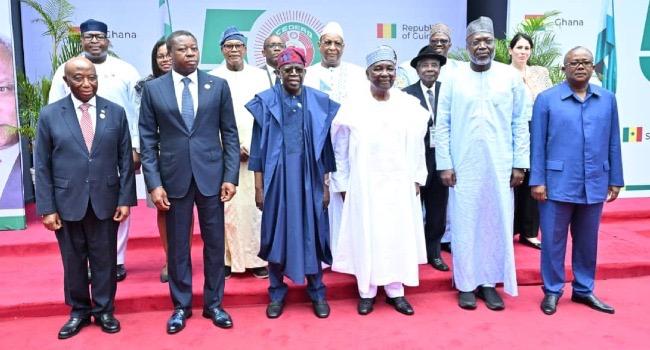President Bola Ahmed Tinubu has called on leaders of the Economic Community of West African States (ECOWAS) to match bold policy declarations with decisive implementation, stressing that the regional bloc must begin delivering tangible results—especially for youth and women, who form the majority of its population.

Speaking in Lagos on Wednesday at the 50th anniversary celebration of ECOWAS, President Tinubu, who currently chairs the Authority of ECOWAS Heads of State and Government, acknowledged the organisation’s historic achievements in regional integration, trade liberalisation, peacekeeping, and democratic governance. However, he asserted that the next chapter must be defined by action, not promises.
“We are lagging behind on implementation, and I urge all member states to match policy with action,” Tinubu said. “Let our citizens feel the real impact of our shared efforts.”
Central to Tinubu’s address was a powerful appeal for youth empowerment and leadership succession across West Africa. He described young people and women as both the current drivers and future custodians of the region’s progress, urging member states to prioritize their education, entrepreneurship, and leadership development.
“We must mentor them. Their success is the key to the future and stability and prosperity of ECOWAS,” he said. “We want to hand a banner without stain to you—the youth of West Africa.”
This call for generational inclusion marked a shift in tone, positioning ECOWAS not just as a legacy of its founding leaders but as a platform for a new, inclusive era of opportunity and growth.
President Tinubu paid tribute to ECOWAS’s founding fathers, particularly General Yakubu Gowon, Nigeria’s former head of state and the only surviving signatory of the 1975 treaty. He also acknowledged the contributions of former ECOWAS leaders and staff who laid the foundation for regional unity.
He praised the bloc’s unification of Anglophone, Francophone, and Lusophone nations, the promotion of free movement across borders, and the creation of key institutions like the ECOWAS Trade Liberalisation Scheme and the ECOWAS Court of Justice.
Despite these achievements, Tinubu acknowledged the persistent challenges facing the bloc—ranging from security threats and food crises to gaps in policy implementation.
“Our greatest challenge now is implementation. The work of integration is never done. Each generation must carry the flame forward,” he added.
Reaffirming Nigeria’s longstanding leadership role in West Africa, President Tinubu pledged continued support through initiatives like Nigeria’s Technical Aid Corps, which has contributed to regional capacity building for nearly four decades.
“For nearly 40 years, Nigeria has supported regional capacity building. We remain committed to deploy skilled professionals to ECOWAS countries,” he affirmed.
He also endorsed ECOWAS’s current efforts in critical areas such as regional security, counter-terrorism, digital transformation, and agricultural reform. Tinubu cited initiatives like the ECOWAS Infrastructure Master Plan 2020–2045 and digital platforms such as Ecogo as examples of the bloc’s forward-looking strategies.
Concluding his address, Tinubu delivered a visionary message—urging leaders and citizens alike to imagine and work towards a peaceful, borderless, and prosperous West Africa that leaves no one behind.
“Let us imagine a West Africa where our economies thrive through joint effort… where our people, diverse yet bound by destiny, work together towards peace, prosperity and justice,” he said.
“This Golden Jubilee is not merely a celebration of the past, but a summons to shape the future.”
VANGUARD







Comment here
You must be logged in to post a comment.